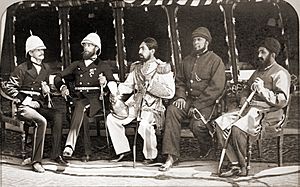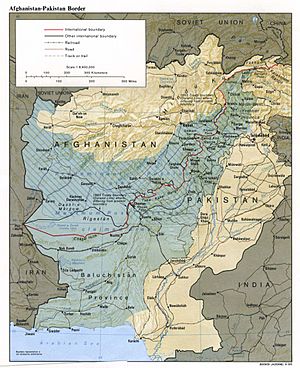Treaty of Gandamak facts for kids

The Treaty of Gandamak was an important agreement that officially ended the first part of the Second Anglo-Afghan War. This war was fought between Afghanistan and the British Raj (which was British rule in India). Even though Afghanistan won the first phase of the war, its leader, Mohammad Yaqub Khan, agreed to give up some border areas and let Britain control Afghanistan's foreign affairs.

The treaty was signed on May 26, 1879. It was signed by Mohammad Yaqub Khan, the King of Afghanistan, and Pierre Louis Napoleon Cavagnari, who represented the British Government of India. They signed it at a British army camp near a village called Gandamak, which is about 70 miles east of Kabul. The Viceroy of India, Lord Edward Robert Bulwer Lytton, officially approved the treaty a few days later, on May 30, 1879.
Many historians see the Treaty of Gandamak as the start of the second part of the Second Anglo-Afghan War, which lasted from 1879 to 1880. After the British won the Battle of Kandahar in 1880, the treaty was confirmed. The British then chose Abdur Rahman Khan, who had been against them, to become the new leader (Emir) of Afghanistan.
Why the Treaty Was Signed
On July 22, 1878, a group from Russia arrived in Kabul without an invitation from the Afghan leader, Amir Sher Ali Khan. To balance this, the British told the Amir in early August 1878 that he had to welcome a special British group with "all proper honors."
However, the British group was not allowed to enter Afghanistan. This happened at a military post called Ali Masjid in the Khyber Pass on September 21. In response, the British Government of India demanded an apology from the Amir by November 20, 1878. The Amir's reply was delayed because his son had died on August 17. When it finally arrived on November 30, it did not include an apology.
Because of this, on November 21, the British Raj declared war on Afghanistan. They took control of the Korram valley and the Paywar pass. British forces also moved through the Khyber Pass and Quetta towards Jalalabad and Qandahar. Amir Sher Ali Khan could not fight back effectively. On December 23, 1878, he left Kabul for Turkestan, hoping to get help from Russia to defend his lands.
Sher Ali died on February 21, 1879, near Balkh. His son, Mohammad Yaqub Khan, then declared himself the new leader of Afghanistan. After talking with Cavagnari, Mohammad Yaqub asked to visit the British military camp. His request was accepted, and he went there to sign the Treaty of Gandamak on May 26, 1879. This treaty was seen as one of the most embarrassing agreements an Afghan ruler had ever accepted. It basically made the Afghan leader a subject of the British Crown.
What the Treaty Said
The treaty had several important points:
- The Afghan leader gave up control over Afghanistan's foreign policy. This meant Britain would handle Afghanistan's relationships with other countries.
- A British group, including European members, was allowed to live in Kabul.
- Control over the Korram and Pishin valleys, the Sibi district, and the Khyber Pass was given to the British.
- The treaty also aimed to increase trade between Afghanistan and British India. It also planned for a telegraph line to be built between Kabul and British India.
- Mohammad Yaqub Khan had to forgive anyone who had helped the British forces during their occupation.
The British group, led by Cavagnari, arrived in Kabul on July 24, 1879. But less than two months later, on September 3, 1879, Cavagnari and all members of his group were killed. This happened when a group of unhappy soldiers from the Amir's army, who were from Herat, attacked the British mission's compound.
This attack led to another British invasion of Afghanistan. Mohammad Yaqub Khan was sent away to India. The British then appointed Abdur Rahman Khan (who ruled from July 22, 1880, to October 1, 1901) as the new leader of Afghanistan. Abdur Rahman was a cousin of Yaqub. He accepted the terms of the Treaty of Gandamak, but with one change: the British agent and his staff in Kabul would be considered Indian Muslims.
See Also
- Anglo-Afghan Treaty of 1919
- European influence in Afghanistan
- Imperialism in Asia
 | Ernest Everett Just |
 | Mary Jackson |
 | Emmett Chappelle |
 | Marie Maynard Daly |

